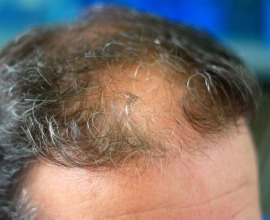What is a hair transplant?
What is a hair transplant?
A hair transplant may sound like a scary medical procedure. It requires healing and discomfort, but hair transplants are nothing to be afraid of. Nobody can help when or if their hair thins or ultimately falls out. There is no reason to feel insecure about the loss of hair, but many people do. Luckily, hair loss doesn’t have to be permanent and hair transplants exist to help those who suffer from hair loss.

What is the process of a hair transplant?
A hair transplant is a surgery that fills in an area with thin or no hair. This surgery has existed since the 1950s, but the process has become more advanced since then. The procedure requires a few steps:
-
The surgeon will clean your scalp and numb your scalp to limit any discomfort.
-
Your doctor will choose one of the two methods for hair transplants which are follicular unit strip surgery (FUSS) and follicular unit extraction (FUE).
-
When using FUSS the surgeon removes a portion of your scalp and sews the scalp closed. The surgeon divides the removed scalp into 500 to 2000 grafts with individual or a few hairs.
-
When using FUE the surgeon will shave the back of your scalp and remove hair follicles. Then the surgeon grafts hair onto your scalp.
-
The process can take between four and eight hours.
This process may seem a bit intimidating, but the payoff of no longer struggling with hair loss is worth it for many people. If you are interested you should speak with a doctor about your expectations and reservations. [1]
How do you recover from a hair transplant?
People recover differently from hair transplants. This can depend on the length and how complex the procedure was. Your doctor will prescribe pain medication to alleviate most of the pain and discomfort you may feel during the recovery process. You can gently wash your hair two days after the procedure. Stitches will be removed between a week and ten days after the procedure. Strenuous activity should be avoided for about three weeks after surgery. Many people feel they can go back to work and normal life a few days after the surgery. Often the new hair will fall out six weeks after surgery, but this is part of the growth process. Some people may need a surgical touch-up after the procedure, but this will be an easier procedure. [2]
Who are good candidates for hair transplants?
There are some factors that make someone a good candidate for a hair transplant. Some of these factors are:
-
Men who have lost hair due to male patterned baldness for more than five years.
-
People who understand that it is possible for hair loss to continue after surgery.
-
People who have been balding for many years and their balding has stabilized.
-
People who have lost hair from trauma or burns.
-
People who have lost hair due to another cosmetic procedure. [3]
It is important to speak with a doctor about your history of hair loss before the procedure. Not everyone will get the results they desire from a hair transplant. It is also important to be realistic about the procedure, you may have amazing results and you may not. Your doctor will do their best to ensure you have good results, but it is hard to predict the body's response to a hair transplant.
Sources:
[1] https://www.webmd.com/skin-problems-and-treatments/hair-loss/hair-transp...
[2] https://www.plasticsurgery.org/cosmetic-procedures/hair-transplantation-...
[3] https://www.webmd.com/skin-problems-and-treatments/hair-loss/are-you-can...














